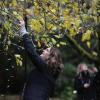November 13, 2006 - 4:00pm
A passion for parasites led Malaspina University-College Biology student Aya Murakami all the way to Ireland.
She was one of 12 science students selected from universities and colleges around the world to participate in a 10-week undergraduate research program at the University College of Dublin.
“It was an amazing experience,” said Murakami, a Japanese international student, currently in her fifth year at Malaspina.
Murakami’s selection, along with students from Kenya, Portugal, the U.S., Columbia and Ghana “is an impressive accomplishment,” especially when you consider there were 200 to 300 applicants world-wide, said Dr. Tim Goater, a parasitologist and professor in Malaspina’s Biology department. “This illustrates the exciting international research opportunities available to Malaspina students,” he added.
“Dr. Goater is crazy about parasites, and he inspired me,” said Murakami. “Both Dr. Goater and Biology professor Allan Hawryzki encouraged me to apply for the research program in Ireland, and I'm grateful they did.”
In Dublin, Murakami was assigned to help a doctoral student with the preliminary stages of her PhD research, investigating a parasite that lives in the mouth cavities of certain fish, including striped seabream.
The parasite, about as big as a human thumb, is a “tongue-eating isopod,” explained Goater. “It gets into the mouth cavities of fish, and eats their tongues down to a small stub. Remarkably, the fish uses the isopod as its tongue for the remainder of its life.”
Their research took Murakami and the doctoral student to Spain, where they hired a boat for net-fishing. “We caught 150 fish at three locations,” Murakami said, “and used laboratories to weigh and measure the fish, remove the parasites for further analysis, and dissect the fish to determine what they had eaten.
“We expected that 80 percent of our fish samples would be infected with the parasite, but it was less than one percent,” Murakami added. “We concluded that more research needs to be done at different locations, and net-fishing isn’t the best method to collect samples.”
For Murakami, the best part of the 10-week program was gaining life experience internationally, working with faculty and student researchers from around the world, and applying skills and research techniques she learned in Malaspina’s classrooms.
Murakami began her post-secondary studies at Malaspina five years ago when she arrived as an international student from Japan. She completed Physics and Chemistry 11 and 12 courses through Malaspina’s Adult Basic Education program, and then enrolled in a first-year university program.
“I planned to transfer to a larger university after two years,” she said, “but many people, including Dr. Goater, convinced me to stay. I’m glad I did, because I really believe I’m getting a better undergraduate education at Malaspina than I would have received elsewhere. My friends at some larger universities wish they were here.”
In addition to excelling at academics, Murakami works in the Math Centre, and volunteers as a peer helper for international students. “I love helping other students,” she said. “Everything is so new and different for them, so it helps them to talk to someone who understands what it is like.” Murakami also fine-tuned her research skills by working part-time as a microbiology research assistant for Malaspina Biology professor John Amaral.
Now half way through her final year at Malaspina, she’s focusing on the future. She plans to obtain her master's degree after she graduates from Malaspina in June 2007, and pursue a career in ecology and conservation.
“Right now, I’m working on a major undergraduate research project in my Biology 491 class, examining the ecology of humpback whale populations,” she said. “We’ll see where the future leads. Maybe one day I’ll end up teaching at Malaspina.”
Malaspina's Dean of International Education, Bronwyn Jenkins-Deas, said many international students choose Malaspina over the big name universities because of small class sizes, quality of instruction and opportunities to interact with and be mentored by their instructors.
“Students also have many opportunities to develop their leadership capacity outside the classroom, like Aya did,” said Jenkins-Deas. “Malaspina allows students to thrive, to realize both their academic and human potential. We are very proud of the tremendous accomplishments of Aya and our other international students.”
Tags: In the Community






